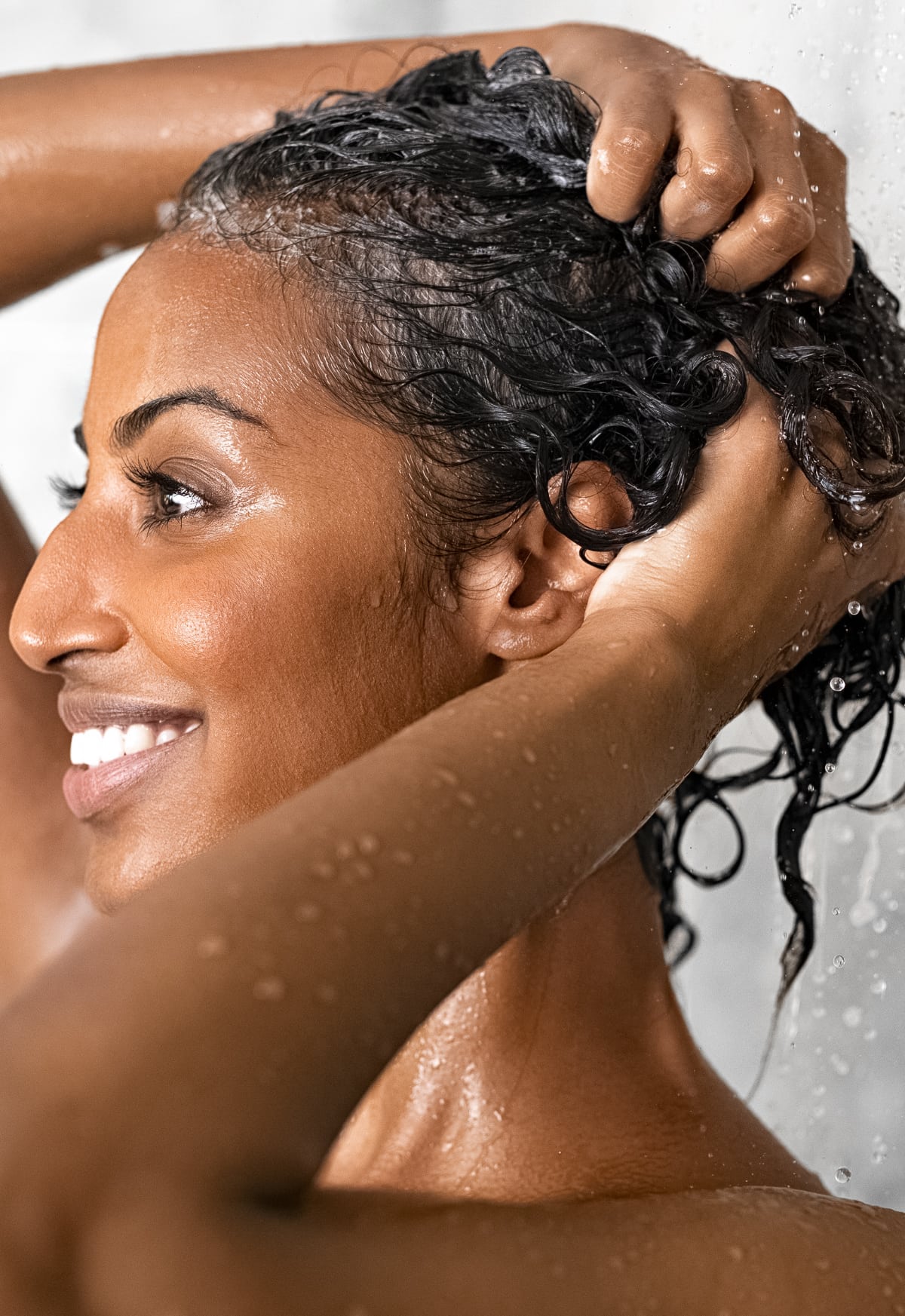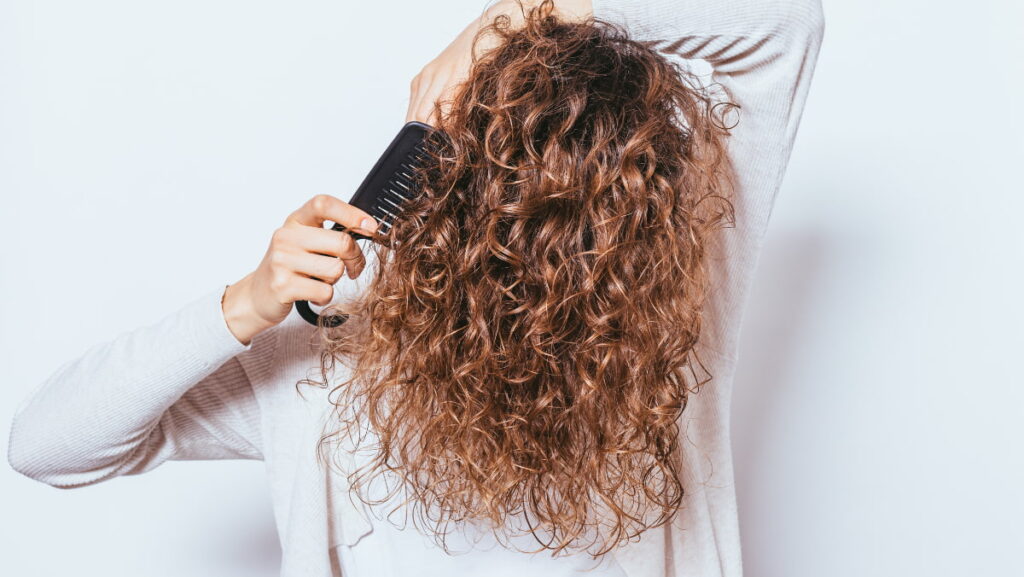
How often should you wash curly hair? It’s a common question and one with a not-so-straightforward answer.
You’ve possibly heard numerous recommendations, from daily washing to once-a-week plans. The fact is, the frequency of washing your curls depends on some factors unique to you.
Initially, your hair type plays a vital role in defining how often you should wash your curly hair? Fine or thin curls might require more frequent washing than thicker locks due to oil build-up at the roots.
Similarly, if your curls are color-treated or chemically processed, they might need less frequent washes to prevent dryness and damage.
The climate where you live can also impact your curly hair care routine significantly. If it’s moist or if you’re active and sweat a lot, you may find yourself needing to wash more regularly than someone living in a cooler environment with less physical activity.
In this article, we’ll delve into these considerations further so that by the end of it all; you can decide what’s best for your curly hair regime!
How Often Should You Wash Curly Hair?
Every head of hair is exclusive, but if you’re a curly-haired specific, your locks require a bit more understanding.
The assembly of your curls makes them prone to dryness and frizz, which might have led you to ponder just how often you should be washing your hair.
Curly hair is inherently drier than straight strands. This is because the natural oils produced by your scalp have a harder time traveling down the coiled structure of each curl.
As a result, these essential oils often don’t reach the ends of your hair, leaving them parched for moisture.
Curly hair’s dryness is heightened by insufficient oil distribution and its coiled structure, enabling moisture to escape through tiny gaps. Consequently, curly hair requires specific care and cleansing methods.
Here’s what matters most:
- Moisture retention: Since curly hair loses moisture quickly, maintaining hydration levels becomes crucial.
- Gentle cleansing: Frequent shampooing can strip away too much oil from already dry strands.
- Stable scalp health: It’s not all about the strands—your scalp needs love too!
Now let’s dive into some specifics about how often you should wash those beautiful curls.

As with many aspects related to personal grooming and beauty care routines, there isn’t one correct answer for everyone when it comes down to how frequently curly-haired folks should shampoo their tresses.
Factors like lifestyle choices (e.g., daily workouts), environment (e.g., living in humid or dry areas), curl type (loose waves vs tight coils), as well as personal preference, come into play here.
But on average,
| Curl Type | Recommended Washing Frequency |
| Loose Waves | Every 2-3 days |
| Medium Curls | Once every 4 days |
| Tight Coils | Once per week |
Keep in mind these are mere guidelines. Your optimal washing frequency may differ due to factors discussed earlier, including product usage, scalp health, and potential medical conditions.
The Impact of Over-Washing on Your Curls
You may not know this, but the truth is, over-washing your curly hair can lead to lots of problems. The first problem you can come across is that over-washing can strip your scalp and hair of its essential oils.
These natural oils play a big part in keeping your hair hydrated and frizz-free. When you’re washing your locks too frequently, your curls will start to lose their shape and become more prone to breakage.
On top of over-washing, you can also affect the health of your hair by overusing shampoos with potent detergents. Those shampoos are intended to cleanse the hair but can result in dry, stripped hair and potentially even harm your hair in the long term.
But don’t panic yet! There are steps you can take to avoid these issues:
- Limit washing: Try reducing how often you wash your hair;
- Use gentle products: Look for sulfate-free shampoos or toxin-free shampoos;
- Deep condition regularly: This helps bring back any lost moisture.
How Often Should You Really Wash Curly Hair?
Now all fun and games that you should “reduce washing your hair,” but what does that mean? Do you need to wash your hair every other day, once a week? Here’s what you should do.
According to the hair expert Lindsey Little, the owner of Lume Salon in Boston, shampooing every other day at most is the general rule.
However, it does depend on the type of curls you have. No curls are the same! The general recommendation for the different types of curls looks like the following:
| Hair Type | Recommended Washing Frequency |
| Wavy | Every other day |
| Curly | Every 2-3 days |
| Coily | Once a week |
It’s essential to test things out and see how your hair responds to it. This way, you can optimize your routine for your curls.
Moreover, the routine doesn’t end when you turn off the shower. A good post-washing haircare routine is very important too! Lindsey Little recommends:
- Blotting your hair after washing to get the excess water out;
- Avoiding rubbing your hair since that creates friction that leads to frizz;
- Using a wide-toothed comb or wet brush to get the tangles out;
- Apply any product you plan to use while your hair is still wet.
Choosing the Right Products for Your Curl Care Routine
Crafting your curl care regimen is a personal journey tailored to your individuality. Choosing products aligned with your hair type is pivotal. Understanding your hair’s porosity can significantly enhance the efficacy of these products.
Hair porosity, simply put, refers to your hair’s ability to absorb and retain moisture. It impacts how well oils and moisture pass in and out of your hair cuticles. You can have low, medium, or high porosity curls. Here’s a quick guide:
- Low Porosity: If you’ve got low porosity curls, they’re likely resistant to moisture. Products tend to build up rather than absorb.
- Medium Porosity: Your curls strike a balance with this type. They hold on to just enough moisture while preventing excess from causing frizz.
- High Porosity: High porosity means your curls may be prone to damage but they also take in more moisture.
The subsequent step? Selecting products based on their ingredients! Look out for:
- Hydrating Ingredients: These are crucial for any curly-haired individual since curly hair tends towards dryness more often than not.
- Protein-rich Ingredients: Especially if you’ve got high-porosity curls that need strengthening.
Here’s a basic guide:
| Hair Type | Key Ingredient |
| Low Porosity | Hydrating ingredients like glycerin |
| Medium Porosity | Balanced blends of proteins & hydrators |
| High Porosity | Protein-rich formulas |
Lastly, don’t forget about styling! The right styling product will seal all that goodness into your locks and give them definition – whether it be gel, mousse, or cream depends entirely on what works best for YOU!
By understanding these basics of product selection according to your curl type and needs, you’ll be able to set up an effective curl care routine that will ensure healthier-looking locks!

Helpful Tips to Keep Your Curls Fresh Between Washes
So, you’re curious about the best ways to keep those curls of yours looking fresh and lively between washes? Well, you’ve come to the right place. Here are some insider tips that’ll help your curly hair stay gorgeous and hydrated without overwashing.
Begin by reducing shampoo frequency. Daily washing is unnecessary. Overwashing can deprive your scalp of vital natural oils, which is detrimental to curl health. A practical guideline is shampooing curly hair 2-3 times weekly.
Secondly, consider co-washing. This means replacing shampoo with conditioner on some days. It’s less harsh on your hair and helps maintain moisture – a big win for those bouncy curls!
Don’t forget about deep conditioning treatments, either. Once a week or so, treat yourself by leaving in a rich conditioner for longer than usual (think 15-30 minutes). This will give your curls an extra dose of hydration they’ll thank you for.
| Action | Frequency |
| Shampooing | 2-3 times per week |
| Co-Washing | Replace some shampoos with this |
| Deep Conditioning Treatment | Once per week |
Next up is the importance of using the right products – quality matters! Look out for products specifically designed for curly hair that are free from sulfates and parabens, as these can dry out your locks.
In addition to this, remember that styling tools like straighteners or curling irons can damage your hair if used excessively. Try embracing natural methods such as braiding or twisting instead when possible.
Conclusion: Finding a Balance in Washing Your Curly Hair
To keep your curly hair happy and healthy, a good hair washing and hair care routine is essential. We learned that overwashing and overusing shampoo can actually damage your hair.
Depending on which hair type you have, generally speaking, you should wash your hair every other day for the best results and frizz-free hair. However, keep an eye out for your hair to see if this works for your curls.
On top of that, the products you use are very vital to the whole process as well. Prioritize sulfate-free shampoos and frequent deep conditioning to provide the hair with the essential nourishment that your curls crave.
Make sure to keep these points in mind, and I’m sure you’ll be able to establish an effective routine for caring for your curly locks. It may take some trial and error, but finding that perfect balance will leave your curls looking their best!
How we reviewed this article
- Process
